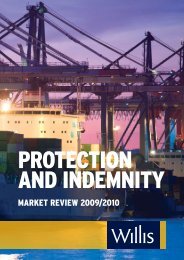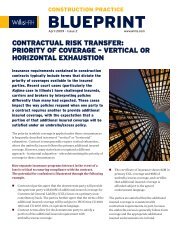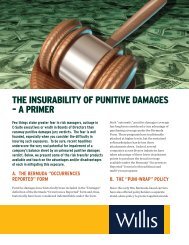spRING 2011 GlobAl MARKETs INTERNATIoNAl - Willis
spRING 2011 GlobAl MARKETs INTERNATIoNAl - Willis
spRING 2011 GlobAl MARKETs INTERNATIoNAl - Willis
Create successful ePaper yourself
Turn your PDF publications into a flip-book with our unique Google optimized e-Paper software.
PolItICal rIsks<br />
iNtRoduCtioN<br />
The Mining industry is quite possibly one<br />
of the most vulnerable to Political Risks in<br />
Emerging markets. Due to its importance<br />
to host economies – mining projects can<br />
potentially represent over 10% of GDP in the<br />
country of production – these projects can<br />
easily become flash points for nationalist<br />
debate and a change in government policy<br />
that can lead to expropriations, licence<br />
cancellations and contract ‘reviews’.<br />
With commodity prices expected to remain<br />
robust, more mining companies see their<br />
future inextricably linked to Africa, Eastern<br />
Europe, Latin America, Southeast Asia and<br />
other ‘new frontier’ regions. As a result, the<br />
words ‘political risk’ are rolling off the tongues<br />
of mining executives and lenders with ever<br />
more frequency. Companies need to conduct<br />
a comprehensive assessment of their political<br />
risk and take steps to adequately mitigate<br />
these risks.<br />
| <strong>Willis</strong> | Mining Market Review <strong>2011</strong><br />
Risks to MiNiNg CoMPaNies<br />
Traditionally, political risk has meant risks created by the action or<br />
inaction of governments, such as expropriation. However, national<br />
governments are no longer the only, or in many cases, the primary<br />
source of political risk for mining projects. Political risk can also stem<br />
from local governments, international and local NGO’s, community<br />
groups, local competitors or any other group advancing political<br />
objectives. Likewise, rather than an outright confiscation of a foreign<br />
investor’s assets, investors are more likely to witness a more indirect<br />
form of government intervention known as ‘creeping expropriation’.<br />
This refers to state conduct that substantially deprives a foreign<br />
investor of the use or benefit of their investments, even though<br />
formal legal title may continue to be vested with the investor.<br />
Such expropriation could take the form of the imposition of a punitive<br />
tax regime that is applied selectively against the foreign enterprise and<br />
which is not applied to local companies. Indeed, taxes and royalties in<br />
the Mining sector have become a major issue.<br />
In 2006, the Mongolian government hastily passed a windfall profits<br />
tax. This was designed to allow the state to benefit from historically<br />
high copper and gold prices, but instead, set the stage for acrimonious<br />
negotiations with the Oyu Tolgoi developer, Ivanhoe Mines Ltd of<br />
Canada. Fears that the Mongolian state would lose out on the benefits<br />
from the USD 4billion Oyu Tolgoi project led the government in 2006<br />
to pass a law requiring the state to take 34% of any deposit.<br />
Debates over the state share and the windfall profits tax followed,<br />
throwing investors into a state of uncertainty and freezing projects<br />
during the peak of the commodity boom. The windfall profits tax did<br />
not apply to ore smelted in Mongolia, but Ivanhoe argued that building<br />
a smelter would raise its capital and investment costs prohibitively.<br />
The windfall profits law assessed a 68% tax on copper above USD<br />
2,600 a tonne and gold above USD 500 an ounce. Ivanhoe’s partner<br />
Rio Tinto, and the Mongolian government, have since reached an<br />
agreement and under the current proposal, the windfall profit tax will<br />
be abolished on 1 January <strong>2011</strong>. Under the new deal the government<br />
gets a flat 34% stake in the Oyu Tolgoi project and other mines. It<br />
can raise that share by 50% after 30 years once the two miners have<br />
recouped their initial investment of USD 4billion. This change in<br />
political priorities, however, only came about following the election<br />
of the Mongolian People’s Revolutionary Party which then placed<br />
a higher priority on developing Mongolia’s mineral resources and<br />
reopening negotiations with Ivanhoe and Rio Tinto.
















